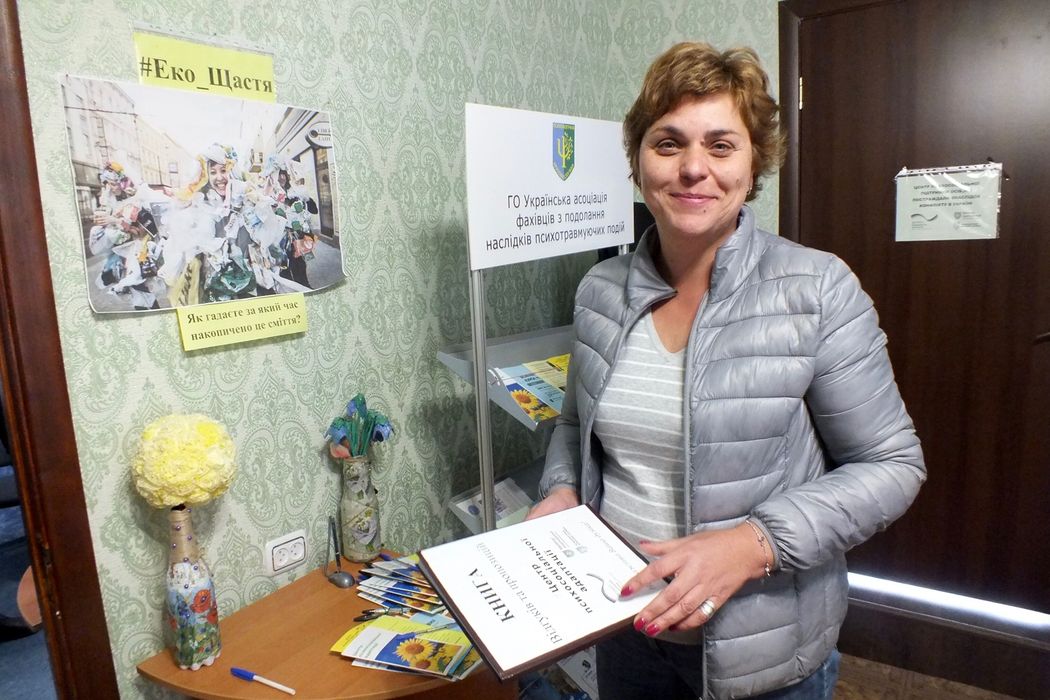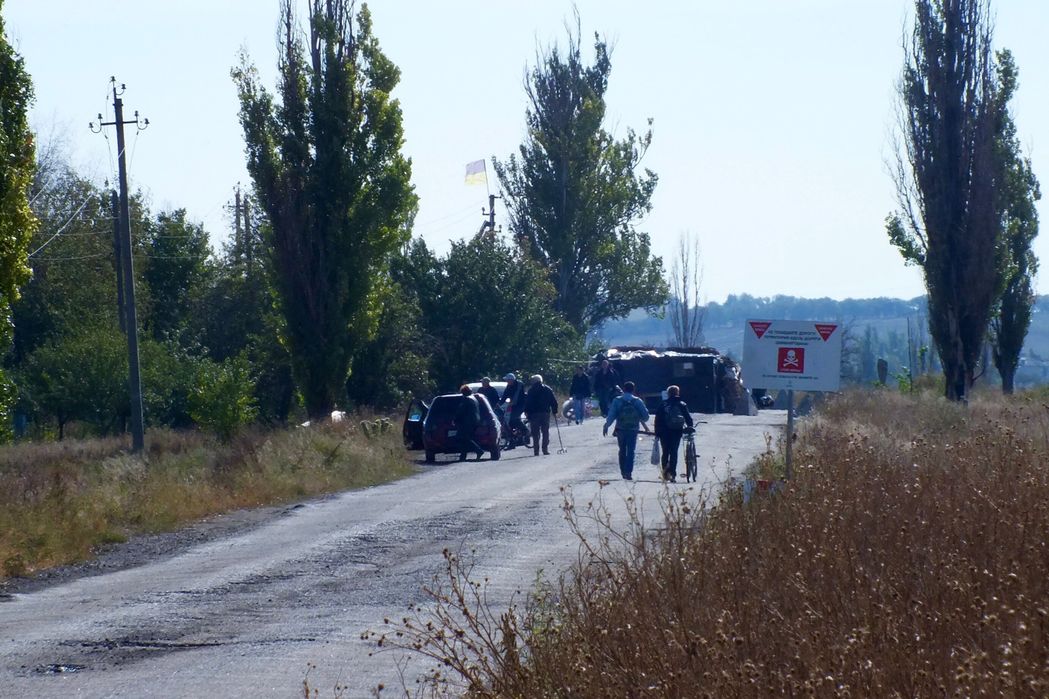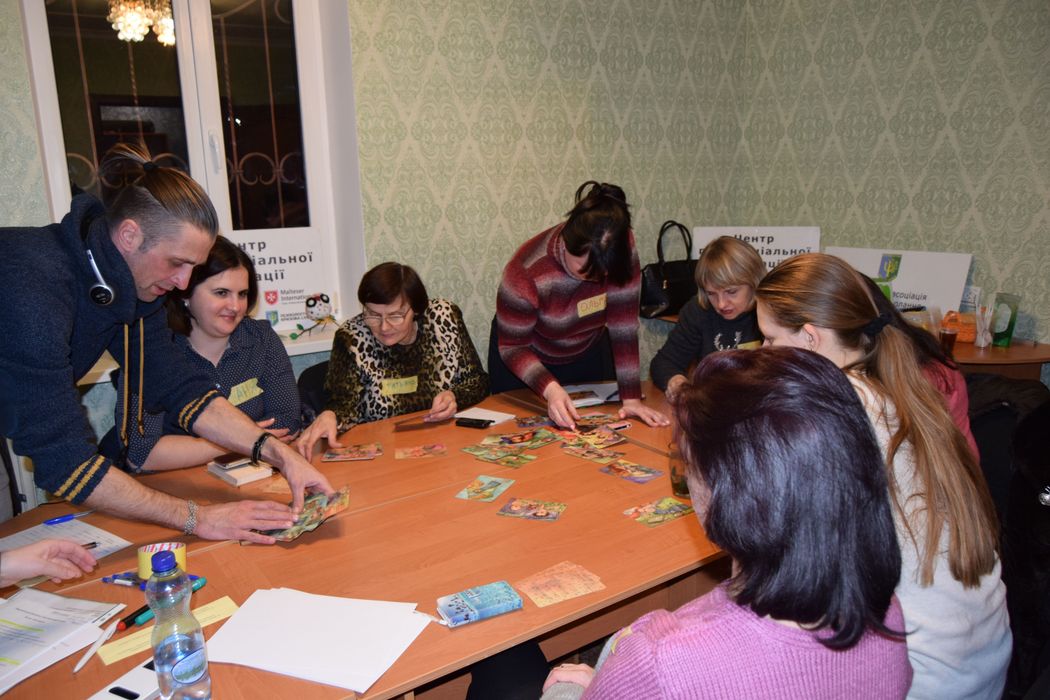"When one finds kindred spirits, there's a lot of things one can do, no matter where"
47-year-old Oksana Khmelnytska is a trauma therapist and project coordinator for our partner organization "Psychological Crisis Service" in Ukraine. On the ground she leads a Malteser International project that provides psychosocial support to people suffering from the consequences of the conflict in eastern Ukraine. In this interview she talks about how people in the region are doing today and the challenges displaced persons face in everyday life, especially those who have fled the conflict areas.

Oksana, how long have you been working on this project? How are those traumatized by the conflict in Ukraine faring today?
Oksana Khmelnytska: "I have been with the project since March 2015. At first glance, the situation has obviously become less acute. A number of aspects of the people's lives have stabilized: Ukraine has a government and a regular army, and the confusion of the first days after Maydan has subsided. The network of aid organisations has also become better organized and established.
From the outside it looks as if everything has already become much better. Only for the people in eastern Ukraine who live directly on the so-called 'contact line', i.e. close to the territory of the separatists. For them not much has changed. They still suffer from completely unpredictable bombardments and never know what will come next."
How has this affected the social situation in the country?
"In Ukraine, the family has always been the first port of call when it comes to dealing with problems. Today we are seeing families being overwhelmed. In the past the family was a stable base for everyone. Now, conflicts are suddenly arising over crucial questions: Do we remain in the conflict zone or do we give up everything? Part of the family wants to leave, others want to stay. People are unsettled, they are not seeing any future. Then comes another bombardment and the next morning the family wonders if it should repair the house again or rather leave completely. That is difficult to bear.
We have seen many broken families: In some cases the men stayed in the separatist area and perhaps fought on that side as well. The women took the children to safety, to Kiev for example. As soon as it is known that their husbands stayed 'over there', they become ostracized. At some point they would like to go back home, but you often se that the children have grown to see themselves in a conflict of loyalty between the two worlds. How is a teenager supposed to deal with this? It's usually the women who somehow hold the family together and at the same time have to deal with their own insecurities and war experiences."


What are the concrete outcomes of these experiences?
OK: There are two different sets of experiences from people who live near the contact line, which they refer to as the front line. For one group of persons, it is all about survival. They hardly leave their homes and try their best to avoid social interaction. This withdrawal symptom is not found in the other group. This group becomes quite hyperactive, seeking employment, constantly doing something. Despite this restlessness, these people have no goal because they cannot escape the situation. Since it is not in our place to offer people hopes for a ceasefire, we try to show people how they can help themselves. The first step here is to understand their problems. People have very little knowledge about the psychological implications of war on their wellbeing. We try to show them better alternatives to alcohol, aggression and self-harm.
Our mobile teams work in the small towns far away from the cities. We provide psychosocial first aid and try to help stabilize people. Then they need strategies on how to cope without losing it. Many studies have shown that mental stress increases when wartime traumas are not treated or at least openly discussed. Without support, people will hardly be able to live together peacefully later on. On top of this, psychological problems are often passed on to the next generation.
At the moment there is no state system in place to offer this kind of support. Ukraine is still undergoing a great deal of upheaval and rehabilitation. The health system still has lots of ground to cover and there is a lack of resources. We can't replace state services, but we can step in to fill the gap in care to prevent human suffering."
Are we also active in the separatist area?
"For bureaucratic reasons, we can't work there. However, in the psychosocial centres we also have patients who live in the separatist area and commute between the two sides. Our service centres are open to all."
What are you particularly proud of regarding this project?
"I can think of two things that are really important to me. On the one hand, we as a team have learned a lot during our work over the past years and have continued to develop. Malteser International has always placed a lot of trust in us and given us the opportunity to try out different approaches. This gave us a lot of responsibility and we grew with it. We have introduced internationally recognised methods. Malteser International is an organisation with a long tradition and much larger than we are. Nevertheless, we have always felt like partners at an equal level. This gives us the feeling that we are not just partners, but part of a large organisation.
On the other hand, I am happy to have the opportunity to work with people and get to know them better. Eastern Ukraine is far away from Kiev and the people are somewhat different from us. But we have found people who share the same values as we do, even if they speak Russian, for example. It is great to see their unrelenting diligence and commitment to serve their region. I have learnt that when one finds kindred spirits, there's a lot of things one can do, no matter where.
When I look back at the whole project today, I can say that it has also become a part of my life. And I must say: It is a great part. Nobody knows what else I would have done with all this time. Given the current situation, it's the best thing I could have done."
(July 2019)








